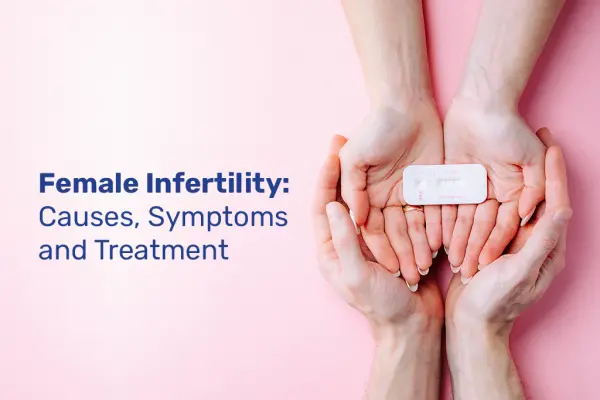What Are the Causes of Female Infertility?
To get pregnant, timely ovulation must happen where an egg is released from either of the ovaries in a woman’s body. This egg must get fertilised by the male sperm in the healthy fallopian tubes. The fertilised egg should then reach the uterus or the womb and get attached/implanted in the uterus layer called the endometrium. If there is an issue with any of the above steps, it can cause infertility in females.
Sometimes, diagnosing female infertility causes could be challenging as many steps occur at a microscopic level inside the body. There could be one or more reasons for infertility. However, sometimes there are no evident causes when it’s termed as unexplained infertility.
Some of the known female infertility causes are as follows:
- Issues with the uterus: Many uterine causes prevent pregnancy.
- Some women have benign tumours (fibroids) or polyps that may prevent the fertilised egg from implanting.
- Some women are born with structural deformities of the uterus. This can affect pregnancy chances.
- Sometimes, there is a narrowing of the cervix, which is the mouth of the uterus. This can be due to damage to the cervix during a previous procedure or an inherited problem.
- Issues with the fallopian tube: The fallopian tube is the most delicate organ of the female reproductive system, responsible for transporting eggs and sperm towards each other. This is also the place where fertilisation occurs, and the embryo goes through growth stages to finally reach the womb. Previous infections, tuberculosis, open surgeries, etc., can lead to damaged or blocked fallopian tubes. This prevents the sperm from travelling through the fallopian tube to combine with the egg. Also, it prevents the fertilised embryo from reaching the uterus.
- Issues in ovulation: There can be absent or infrequent ovulation that will prevent the woman from conceiving spontaneously. This occurs if the woman has:
- Polycystic ovarian syndrome (PCOS): In women with PCOS, there is excess production of androgen,s, i.e. male hormones and imbalance in female hormones, which do not allow the regular release of eggs from the ovaries. PCOS is the most common cause of infertility.
- Hypothalamic dysfunction: The hypothalamus is an organ in the brain which produces GnRH hormone that regulates the two main hormones responsible for follicular growth and ovulation, i.e. follicle-stimulating hormone (FSH) and luteinising hormone (LH). Any dysfunction in the hypothalamus can affect the levels of these hormones, ultimately affecting ovulation and causing infertility.
- High prolactin levels: High levels of prolactin hormone, produced from the pituitary, can lead to suppression of GnRH Hormone from the hypothalamus and lead to diminished FSH and LH, which in turn can lead to ovulation defects and associated infertility
- Primary ovarian insufficiency: in some women, the ovaries stop producing eggs prematurely, resulting in infertility. The cause is mostly unexplained but could also be immunological or genetic.
- Issues with egg quality and count: Women are born with a fixed number of eggs and keep using them continuously since the start of menarche. The body naturally selects and uses the best eggs earlier; hence women in the older age groups will have lower egg numbers and quality. Some women born with lower egg numbers will run out of eggs early. It’s known that eggs from women with higher age and lower egg reserve may have abnormal chromosome numbers in resultant embryos that prevent implantation, leading to increase miscarriage and some genetic issues with the fetus.
- Endometriosis: This is a condition in which endometrial tissue grows in unusual places like the ovaries, uterine walls, and in pelvic areas. This ectopic endometrial tissue causes painful menses, may block the fallopian tubes, cause cysts in ovaries and decrease the chances of implantation of an embryo. It may also indirectly affect egg quality and sperm motility.
What Are the Symptoms of Female Infertility?
The female infertility symptoms are as follows:
- Longer than usual menstrual cycle (35 days or more)
- Shorter than usual menstrual cycle (less than 21 days)
- Irregular menstrual cycle
- Absent menstrual cycle
- Painful menses
What Is the Female Infertility Treatment?
Female infertility treatment depends on the female’s age, duration of infertility, cause and preference for treatment. Treatment or fertility restoration includes the use of medications or surgical interventions. One can take advantage of reproductive assistance to become pregnant.
Medications to restore female fertility:
Fertility drugs stimulate ovulation and regulate hormonal imbalances. These drugs include the drugs that:
- Increase the level of FSH and LH
- Stimulate the ovaries to make more eggs and help in ovulation
- Help PCOS patients with ovulation
- Rectify ovulation issues due to prolactin
Surgical Interventions to restore female fertility:
Surgical interventions are used when there are structural issues not rectified by other non-surgical treatment options
- Laparoscopic or hysteroscopic surgery: This is used to remove uterine problems, including fibroids, endometrial polyps or uterine adhesions.
- Tubal surgeries: This surgery is done in patients with a blocked fallopian tube. It may help clear the simple blockage.
Reproductive assistance:
Instead of taking medications, one can consider reproductive assistance to conceive.
- Intrauterine insemination (IUI): In this technique, healthy sperm are injected into the uterus during ovulation.
- Assisted reproductive technology: This technique includes IVF. In this technique, matured eggs are fertilised by a healthy sperm in the lab. After fertilisation, the resulting embryos are cultured, and one or two best embryos are then transferred into the uterus to affect pregnancy.
Conclusion
There are multiple causes of female infertility, including uterine issues, ovulation, fallopian tube, egg quality and number and endometriosis. There are several ways in which female infertility is treated. These include both surgical and non-surgical interventions. If you suffer from any of the above symptoms and are unable to conceive, it is crucial to consult a gynaecologist to discuss further steps.

